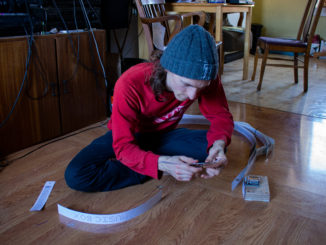Prevention is the best way to stop bullying, says national anti-bullying charity

Clifton Tam
Kicker
Pink Shirt Day, a public campaign since 2007, aims to raise awareness and fight against bullying by wearing pink. Although it has been held annually for more than a decade, unfortunately, bullying still remains an issue.
Jennifer O’Donnell, the executive director of No Time for That (Anti-Bullying Society), says creating intolerance for any sort of bullying is the key to stopping it.
“We need to really have that ongoing, proactive measurements of prevention, education and support,” said O’Donnell. “This (bullying) isn’t a someday problem. This is a now problem.”
According to a 2019 study by Statistics Canada, over 70 per cent of Canadian youth aged 12-17 have experienced bullying, highlighting the urgency of addressing the issue.
Anti-bullying movements shouldn’t be only for one day, says O’Donnell. Beyond wearing pink, people can fight against bullying by volunteering with charitable groups or participating in anti-bullying activities.
Parents Derek Brouwer and Roberta Oliveto, raise awareness of bullying by selling pink shirts on Facebook and donating 15 per cent of their sales to No Time for That (Anti-Bullying Society).
“The majority of our designs are about spreading kindness more than anything else,” said Brouwer. “Bullying may be infectious. Kindness, we believe to be more infectious and more effective as well.”
The best way to stop bullying is through prevention, says O’Donnell.
“By educating everybody and getting everybody talking about it, then we can prevent it,” said O’Donnell.
Kids sometimes don’t know they are bullying someone, says Brouwer, because they haven’t been taught about bullying in school.
Oliveto comes from Brazil. And Brouwer says his fiancée taught him something about the way such issues are dealt with in her country.
“… having consideration for other’s feelings and the impact of our words,” said Brouwer. “It’s just such a strong message that I just don’t remember being taught here when I was a child.”
Empathy, says O’Donnell, is a big part of dealing with the issue.
“Because, even for those who are bullying, (it’s) right to have empathy for them, a bully isn’t just born one day, things happen to create a bully,” said O’Donnell.
Spreading positivity, empathy, and kindness to everyone through education, says O’Donnell, can stop bullying from happening.
Everyone deserves to be treated with dignity, says Brouwer.
“One of the biggest things that we all need to do is to have more consideration for people,” said Brouwer. “Whether it be an employee at Walmart, somebody working in a fast-food restaurant, we’ve got to remember that every one of them is a person. We have no idea what their life is going like at any given time.”
Parents need to be good role models for their children, he says, because kids are going to watch and learn from the actions of their parents.
“Be the example our children need,” said Brouwer. “Let our kids see how we talk to others, how we treat others.”
Bertha Tobin, a guidance counsellor at College of the North Atlantic, says the impact of bullying on someone’s mental health and wellness is long-lasting.
“Start the conversation and you let people know (what happened) instead of keeping it under your hat.”
Starting the conversation and keeping the message going is fundamental to stopping bullying, says O’Donnell.
“I would love to hear stories of the message of Pink Shirt Day actually carrying on throughout not only the school year, but the full year,” said Brouwer.
It’s not just part of growing up, says O’Donnell.
“We want people to know that bullying is not inevitable or unavoidable,” said O’Donnell.




Be the first to comment